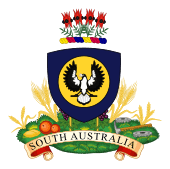Government of South Australia facts for kids
| State Government | |

|
|
| Formation |
|
|---|---|
| Founding document | Constitution of South Australia |
| State | |
| Country | |
| Crown | |
| Head of state (sovereign) | Monarch (Queen) |
| Vice-regal representative | Governor |
| Seat | Government House |
| Legislative branch | |
| Legislature | Parliament of South Australia
|
| Meeting place | Parliament House |
| Executive branch | |
| Head of government | Premier |
| Main body | Cabinet of South Australia |
| Appointer | Governor on behalf of the Queen of Australia in right of the State of South Australia. |
| Headquarters | State Administration Centre 200 Victoria Square |
| Main organ | Executive Council of South Australia |
| Departments | 15 departments |
| Judicial branch | |
| Court | Supreme Court |
| Seat | Supreme Court building, Adelaide |
The Government of South Australia is the group of people and organisations that run the state of South Australia. It is also known as the SA Government. This government is based on the Westminster system, which means it has an elected parliament that makes laws.
Contents
History of South Australia's Government
Before 1857, South Australia was a 'province' ruled by a Governor. This Governor answered to the British Queen or King.
In 1857, South Australia became 'self-governing'. This meant it could make its own laws, instead of being fully controlled by Britain. This change happened because of a special law called the Constitution Act 1856.
In 1901, Australia became a country made up of different states, including South Australia. This is called the federation of Australia. South Australia joined the Commonwealth of Australia but still kept many of its own powers. The Constitution Act 1934 is the main law that guides the South Australian government today.
How Laws Are Made
The power to make laws in South Australia belongs to the Parliament of South Australia. The Parliament has two main parts:
- the South Australian House of Assembly
- the South Australian Legislative Council
People in South Australia vote in South Australian state elections every four years. In these elections, all members of the House of Assembly are chosen. Half of the Legislative Council members are also chosen at the same time.
Who Runs Things
South Australia's government works like the Westminster system. This is a type of parliamentary system where the government is formed by the party that wins the most votes.
Executive Power
The main power to run the state is held by the Executive Council. This group includes the Governor and important government ministers. In practice, the Premier and the Cabinet of South Australia make most of the decisions. They give advice to the Governor.
The Cabinet is made up of 15 ministers. These ministers are members of either the House of Assembly or the Legislative Council. The Cabinet decides on new plans and policies, which are then presented to the Parliament.
Judicial Power
The power to interpret laws and make sure they are followed is held by the courts. The highest court in South Australia is the Supreme Court of South Australia. There are also other courts below it. However, the High Court of Australia and other federal courts have the final say on matters covered by the Australian Constitution.
Current Leaders
As of March 2022, the main leaders of the South Australian Government are members of the Labor Party. The table below shows some of the key ministers and their roles:
| Minister | Portfolio | Party | ||
|---|---|---|---|---|
| Peter Malinauskas MP | Labor | |||
| Susan Close MP |
|
Labor | ||
| Stephen Mullighan MP |
|
Labor | ||
Government Departments and Agencies
The South Australian Government provides many services to people. It also creates rules and policies through different groups called agencies or departments. Each department is led by a government minister.
As of March 2020, there were 28 government departments and agencies. Some examples include:
- Attorney-General's Department (deals with legal matters)
- Department for Child Protection (helps children and families)
- Department for Correctional Services (manages prisons)
- Country Fire Service (CFS) (fights fires in country areas)
- Department for Education (manages schools)
- Department for Environment and Water (looks after nature and water)
- Department for Health and Wellbeing (manages hospitals and health services)
- South Australia Police (keeps people safe)
- State Emergency Service (helps during emergencies like floods)
- TAFE SA (provides vocational training)
- South Australian Tourism Commission (promotes tourism)
Government Businesses
Some government groups also run businesses. These are called Government Business Enterprises. Examples include:
- South Australian Forestry Corporation (ForestrySA) – manages forests
- South Australian Water Corporation (SA Water) – provides water services
See also
- List of South Australian government agencies
- List of South Australian Ministries
 | Precious Adams |
 | Lauren Anderson |
 | Janet Collins |




